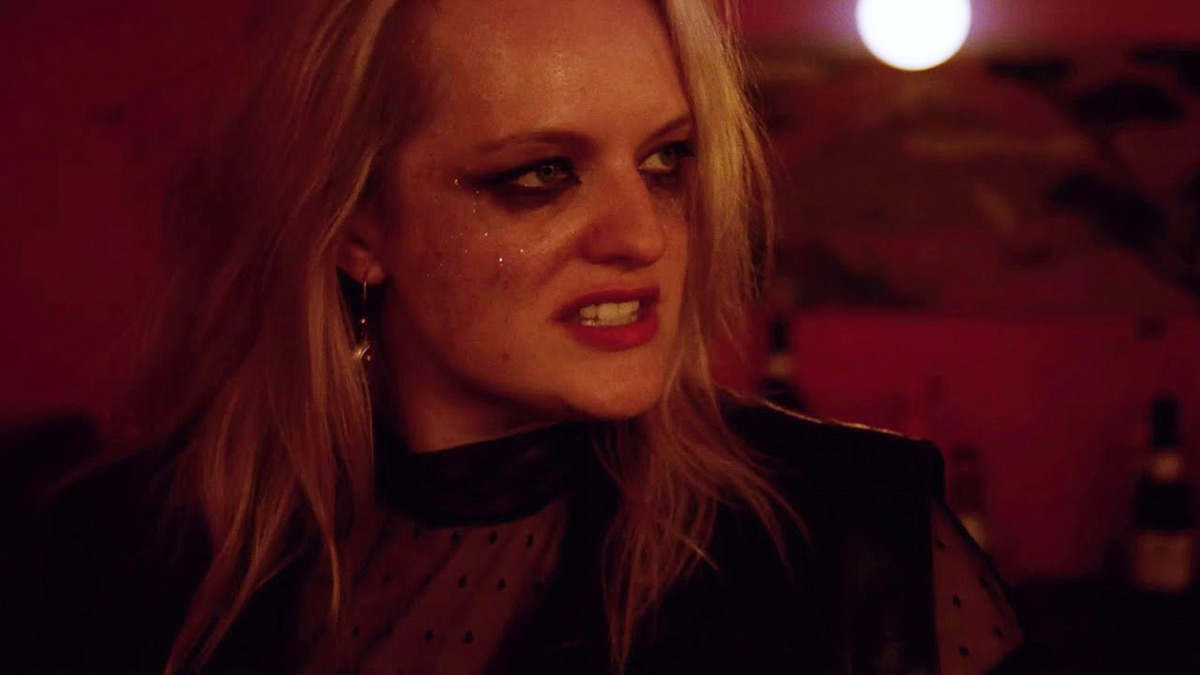A film’s title is important. It gives audience some insight, be it a name, a description, or a vague allusion to the theme. In the case of Her Smell, the title is (excuse the pun) somewhat on the nose.
Opening in the sickly-lit fluorescence of a concert venue’s backstage, we are introduced to Something She, a trio of 90s punk rock Riot Grrrls who are smoking and looking bored directly under a “no loitering” sign, before storming back onstage to rock out a final encore. Everything about it is raw, vivacious and as obnoxiously self-insistent as the music scene of the time. It’s a sweaty, smoke-filled movie, harshly shot with long takes and handheld cameras right in everyone’s faces. But through that you get a real sense of the gritty viscerality of the situation: the grime, the sweat, the spit, and, at the centre of it all, Becky Something. She’s constantly so in your face that you could almost taste her.
Elizabeth Moss as Becky is frankly incredible to watch. She disappears into the role of the narcissistic, callous rock prima donna. Writer/director Alex Ross Perry has stated in interviews that he got the idea for the film while watching documentaries about Guns N’ Roses reforming, and it’s not a great leap to jump from Becky’s drug-fuelled, crazed ego-centrism to the legendary antics of Axl Rose. Through the film’s bizarre five acts, we follow Becky down the toxic spiral of her destructive relationship with everyone else in her life. Each lengthy real-time act is separated by snippets of old home video, showing the band at their first break of fame. Throughout, she constantly wrestles with her fads and her recklessness as she struggles to understand who she really is behind the mask. As she all but tears herself apart onscreen, then builds herself anew, both she and the audience grow closer to the elusive essence of who she is.
But it’s not a one-woman show, and it would be massively remiss not to mention the sterling work of the rest of the cast, with Agyness Dean and Gayle Rankin holding court as long-suffering band mates Marielle and Abi, who act as Becky’s constant crutches and whipping girls. Meanwhile, Eric Stoltz puts in a commendably defeated turn as the band’s producer, complemented well by a massively understated performance from Dan Stevens as Becky’s ex-boyfriend and baby-daddy. There are also smaller but important parts for the likes of Virginia Madsen, Cara Delevingne, Amber Heard and Ashley Benson. Everyone brought their A-game to this movie, with no exceptions.
The flaw in this film is that despite such great work going on, there’s a fundamentally irritating quality to both the story and to Becky herself. Each of the five sections of the film overstays its welcome and, through sheer attrition, the narrative feels like it ought to be coming to an end around the start of the fourth. While the initial few are interesting, the point of each feels like it gets hammered home repeatedly. Even during the quieter, more introspective segment, Perry finds time to have Becky sing two complete songs only a scant few minutes apart. There’s an indulgent insistence to the film that drags beyond the point of comfort in almost every aspect, which makes the experience grate somewhat. Even if that is the very intent, it’s one that insults the audience’s patience a little too far.
That said, it’s a rollercoaster of a journey to have gone through. Perry and the rest of his cohorts have crafted a unique experiment in filmmaking that is well worth experiencing. For all the grit, dirt, screams and tears, it’s a fulfilling one; one that touches on who we are, and what is most important. It’s only in snatched moments throughout the film, with Becky, face nuzzled into her daughter’s hair or clothes, that we see that perhaps the title might just be a lot more wholesome that the film lets on.
